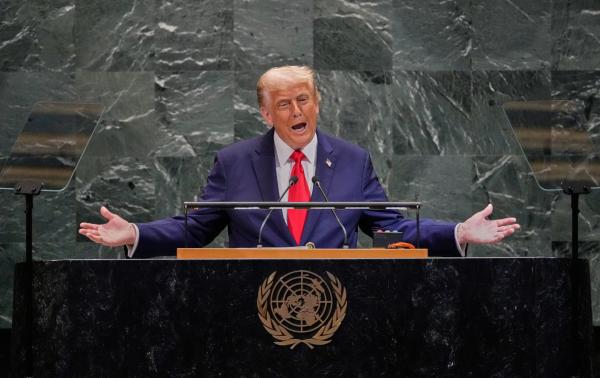The Trump Doctrine: My Take on the UN Speech

Yesterday, despite a broken escalator and a malfunctioning teleprompter, President Trump took the United Nations stage with trademark confidence, as if the microphone had been waiting for him all along. His address bulldozed through the diplomatic crowd — not polite, not nuanced, certainly not tailored for the unfriendly audience. It was blunt, brash, and unapologetically populist: the verbal equivalent of a sledgehammer crashing down on the glass table otherwise known as the UN forum. This virtual sledgehammer was the Trump Doctrine — sovereignty first, skepticism of multilateralism second, and economic muscle driving both.
MAGA? That was the warm-up act. The Trump Doctrine is the headliner.
So what is it, boiled down? In brief: guard the borders, put American workers and taxpayers first, use tariffs and sanctions without apology, and treat international organizations as tools, not overlords. UN, WTO, IMF, or EU bureaucrats are no longer allowed to have a say in how Americans live, work, or pay taxes. Get the memo: America first and foremost.
Yes, back in 1944, practically on the eve of the Normandy landings, the United States had its allies sign up for the Bretton Woods globalist framework, which heralded the Marshall Plan. Globalism took off, turning Uncle Sam into a patron saint. That was then. This is now. Right now, it's every man for himself. Of course, that doesn't necessarily mean isolationism. America still needs allies who have something to offer. Meanwhile, takers need not apply.
Pitch in or get out.
On climate politics, the president didn't bother with polite disclaimers. He called the whole thing a confidence game — the kind of racket where elites get rich while workers get pink slips. Instead of bowing to carbon sermons, he doubled down on fossil fuels as a geopolitical weapon. The conservative case is straightforward: you don't dismantle your factories to virtue-signal while Beijing and Moscow crank out coal plants at will. Energy independence isn't just economics; it's survival.
In Trump's America, techno-nationalism is the new American Dream. No tech, no nation. Period.
Migration? Trump delivered the sermon and the ultimatum in the same breath. Open-door policies plus radical green experiments equal social chaos. And he wasn't shy: UN migration “assistance” is a mirage. Sovereignty means knowing who enters and why. For conservatives, it's common sense: borders aren't suggestions; they're lines in the sand.
And let's be clear: the U.S. Constitution doesn't call the president “Global Humanitarian-in-Chief.” It calls him Commander-in-Chief. Security first. Always.
Then came the economics — the heart of the Trump Doctrine. Tariffs, sanctions, and energy dominance are no longer dirty words. They're weapons of statecraft. Trump practically beamed when he promised a “very strong round of powerful tariffs” on Russia to push peace forward. Ukrainians cheered. Europeans squirmed. And the message was loud and clear: if allies won't join in, America will go it alone. No free lunch, no free ride, and certainly no free gas from Russia. Buy American or pay the price.
That's the Trump Doctrine: no carrots, just sticks — and plenty of them. Allies can love it or leave it.
So it was fitting that one of the sharpest jabs of the speech was aimed straight at the UN itself. Trump mocked it as “full of empty words.” And he's right.
Conservatives know that institutions matter only when they deliver. Otherwise, they're just overpriced talking shops where diplomats sip wine and draft communiqués no one reads. The Trump Doctrine doesn't rule out cooperation; it rules out fake cooperation. If the UN can't stop wars, enforce peace, or defend freedom, why bankroll it? America doesn't buy failure sold as success.
Of course, even conservatives should keep a little humility here. Strength without prudence is recklessness, and swagger without a plan is just swagger. The genius of the Trump Doctrine — if applied wisely — is to pair the hammer with a blueprint: tariffs used surgically, migration reform tied to foreign-aid leverage, energy policy aimed at securing supply while innovating at home.
The world is messy. We need a map and a megaphone.
Trump's speech was aimed at three audiences — American voters, nervous allies, and smirking adversaries. For voters, it was a promise that their jobs and security come first. For allies, it was a warning that foot-dragging has consequences. For adversaries, it was a reminder that America is back in the driver's seat — and this driver doesn't believe in speed limits.
Thunder gets attention, but steady rain grows the wheat. Trump delivered the thunder at the UN. Now the question is: can he deliver the rain to America? Because if the Trump Doctrine becomes more than just bravado — if it's backed with discipline, diplomacy, and determination — America stands to gain peace, prosperity, and liberty. If not, well, polishing the wheels won't fix a broken cart.
Common sense is back. It has to be.
Author: renqiulan
